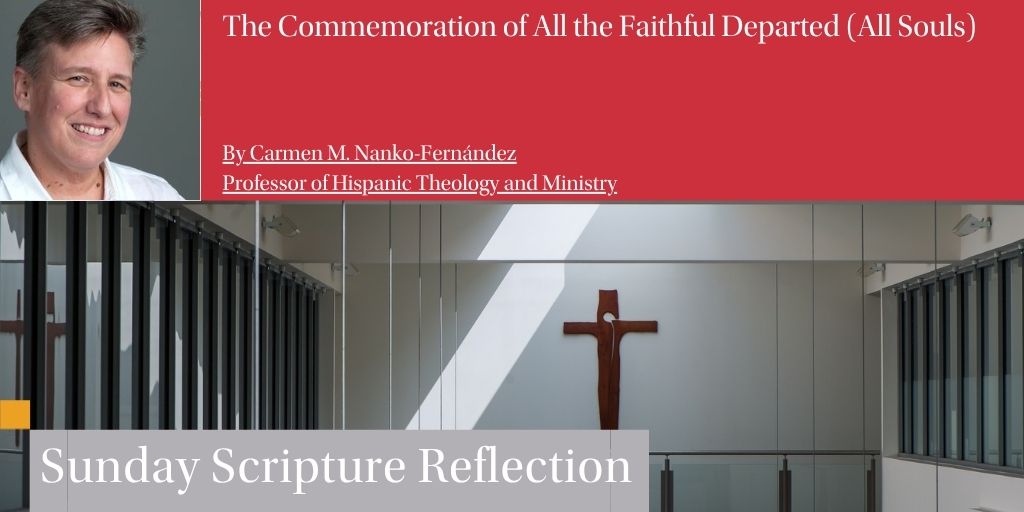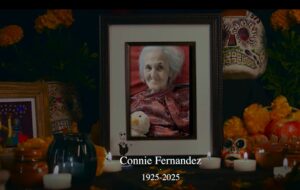

Professor of Hispanic Theology and Ministry
Readings:
Wisdom 3:1-9
Psalm 23:1-3a, 3b-4, 5, 6
Romans 5:5-11
John 6:37-40
Thanks to the National Mexican Museum of Art in Pilsen, mi tía Connie finally made it to Chicago on Saturday 25 October, at least her photo did.
 Projected onto a screen on the grounds of the museo, with over 600 others who have passed away, she was part of their annual illuminated ofrenda commemorating Día de los Muertos Xicágo.
Projected onto a screen on the grounds of the museo, with over 600 others who have passed away, she was part of their annual illuminated ofrenda commemorating Día de los Muertos Xicágo.
Each loved one remembered, onsite and livestreamed on YouTube, flashed across the screen on the virtual ofrenda, present for 10 seconds as twilight claimed the sun. I watched, from her home in New York, as my aunt appeared in the city of my work. “In the time of their visitation they shall shine, and shall dart about as sparks through stubble” (Wisdom 3:7).
These are the words from one of the many selections of readings that the lectionary offers us for the Commemoration of All the Faithful Departed. The options for this memorial day set aside for All Souls are the same as those available for Roman Catholic funeral Masses. Parishes, bishops’ conferences, and the funeral industry are among those who provide guidance and resources that enumerate the rich selection. While many in the United States will encounter the readings found on the daily lectionary calendar of the USCCB, the bishops make clear that they reflect “a selection of the readings that may be chosen for this day.”
Across the array of texts several themes resound: mercy, memory, hope. Pope Francis, in his 2023 homily for All Souls, reminded us that this day is about remembrance, not only of those who were good to us, especially among our family, friends, and loved ones, but “also remembrance of those who did not manage to do so much good, but who have been received in God’s memory, in God’s mercy. It is the mystery of the Lord’s great mercy.”
This day of All Souls is also about remembrance of those we do not know. It is a cry of ¡Presente!
- for those disappeared;
- for those left without names;
- for those abandoned and forgotten;
- for those without loved ones to mourn them;
- for those lost even unto themselves.
To remember and make present is an ethical obligation, an act of justice, a preferential option for those made invisible and erased, an acclamation to the God who forgets no one.
The mystery of this day and its rituals of remembrance point to the communion of saints and the divine promise that death does not have the last word, relational bonds of care prevail. On the día de los muertos ofrendas, mementos of daily life, culture, and religion enflesh memories of nuestros difuntos. They remind the living that accompaniment does not cease; love does not die.
Hope never disappoints, Paul tells the Romans (5:5) and Pope Francis concurs. For Francis, hope is a theological virtue “of the kitchen,” in other words—daily, approachable, sustaining. Through memorial days and rituals of commemoration we navigate the “tension between memory and hope.” We affirm that where there is remembrance there is mañana!
Carmen M. Nanko-Fernández is professor of Hispanic theology and ministry and director of the Hispanic Theology and Ministry Program at the Catholic Theological Union in Chicago.